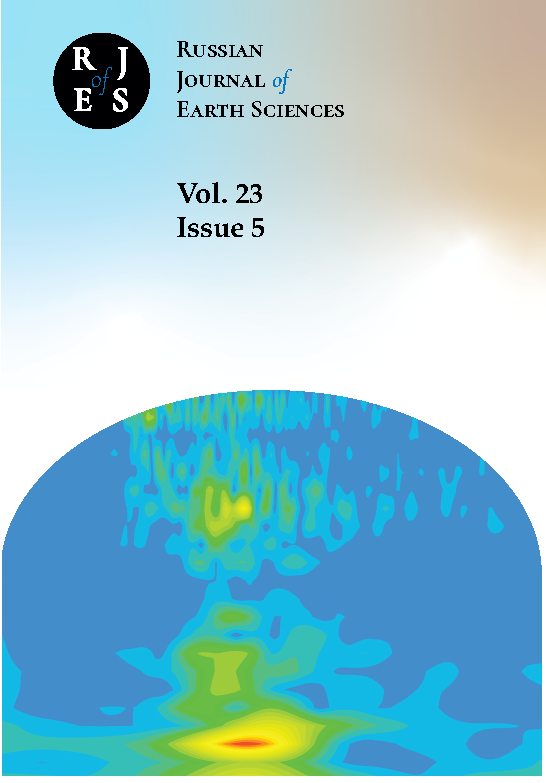Novosibirsk, Novosibirsk, Russian Federation
Novosibirsk, Novosibirsk, Russian Federation
UDC 55
UDC 550.34
UDC 550.383
CSCSTI 37.01
CSCSTI 37.15
CSCSTI 37.25
CSCSTI 37.31
CSCSTI 38.01
CSCSTI 36.00
CSCSTI 37.00
CSCSTI 38.00
CSCSTI 39.00
CSCSTI 52.00
Russian Classification of Professions by Education 05.00.00
Russian Library and Bibliographic Classification 26
Russian Trade and Bibliographic Classification 63
BISAC SCI SCIENCE
A thermodynamic study was carried out in order to determine the forms of transport for the entire series of lanthanides and their ratio with changing parameters of a hydrothermal fluid of moderate concentrations of chloride, carbonate and fluoride components. Hydrothermal solution, cooling from 500 to 100 ∘C, affected barite and celestine, which are used as a source of sulfate sulfur, monazite as a source of rare earth elements (REE) and phosphorus, and calcite as a source of calcium. It has been established that, under weakly acidic (pH about 4.1) conditions, the equilibrium mineral association is represented by rare earth fluorite, monazite, rare earth fluorapatite, and strontiobarite. In the high-temperature region for light and medium REE, the leading is the first chlorocomplex LnCl+2. For heavy REE, the second fluorine complex LnF+2 takes the first place, except for terbium and dysprosium, for which a sharp predominance of the sulfate complex is revealed. A special picture is observed at 100 ∘C: the leading position is occupied by Ln+3 for both light and heavy REE. In the case of a near neutral weakly alkaline fluid (pH about 7.1), the equilibrium mineral association is represented by calcite, monazite, REE-fluorite, REE-fluorapatite, strontiobarite, and strontianite. The appearance of the latter in natural associations may serve as an indication of the increased alkalinity of the ore-forming environment. In an equilibrium weakly alkaline fluid up to 200 ∘C, hydroxocomplexes are prevalent for all REEs with the ratio Ln(OH)03> Ln(OH)+2. The first chloro complex for light REE at 500–400 ∘C, and the second fluoro complex for medium and heavy REEs follow them. At 100 ∘C, the concentration of hydroxocomplexes sharply decreases, and fluorine and carbonate complexes come to the fore. In general, there is an increased stability of the first chlorocomplex in the high-temperature region, and with decreasing temperature, the role of REE fluorocomplexes increases. Two variants of acidity-alkalinity calculations presumably correspond to modeling of two types of fluids: greisenizing – weakly acidic and carbonatite-forming – weakly alkaline.
lanthanides, transport forms, hydrothermal fluids, monazite, rare earth fluorite, rare earth fluorapatite, barite, celestine, strontianite
1. Stepanchikova S. A., Biteikina R. P., Shironosova G. P., et al. An experimental study of hydroxo complex formation in basic and near-neutral solutions of rare-earth elements and yttrium at 25 ∘C // Russian Geology and Geophysics. - 2014. - Vol. 55, no. 8. - P. 1188-1193. EDN: https://elibrary.ru/SKHNXD
2. Shironosova G. P., Prokopyev I. R. Thermodynamic modeling of REE + Y speciation in cooling sulfate-rich fluids // Bulletin of the Tomsk Polytechnic University. Geo Assets Engineering. - 2019. - Vol. 330, no. 11. - P. 7-18. - DOI:https://doi.org/10.18799/24131830/2019/11/2343. EDN: https://elibrary.ru/IAPQFZ
3. Gysi A. P., Harlov D., Filho D. C., et al. Experimental determination of the high temperature heat capacity of a natural xenotime-(Y) solid solution and synthetic DyPO4 and ErPO4 endmembers // Thermochimica Acta. - 2016. - Vol. 627-629. - P. 61-67. - DOI:https://doi.org/10.1016/j.tca.2016.01.016. EDN: https://elibrary.ru/WPSFAT
4. Gysi A. P., Williams-Jones A. E., Harlov D. The solubility of xenotime-(Y) and other HREE phosphates (DyPO4, ErPO4 and YbPO4) in aqueous solutions from 100 to 250 ∘C and psat // Chemical Geology. - 2015. - Vol. 401. - P. 83-95. - DOI:https://doi.org/10.1016/j.chemgeo.2015.02.023. EDN: https://elibrary.ru/SNAGJH
5. Haas J. R., Shock E. L., Sassani D. C. Rare earth elements in hydrothermal systems: Estimates of standard partial molal thermodynamic properties of aqueous complexes of the rare earth elements at high pressures and temperatures // Geochimica et Cosmochimica Acta. - 1995. - Vol. 59, no. 21. - P. 4329-4350. - DOI:https://doi.org/10.1016/0016-7037(95)00314-P. EDN: https://elibrary.ru/AOMKGR
6. Hatch G. P. Dynamics in the Global Market for Rare Earths // Elements. - 2012. - Vol. 8, no. 5. - P. 341-346. - DOI:https://doi.org/10.2113/gselements.8.5.341.
7. Johnson J. W., Oelkers E. H., Helgeson H. C. SUPCRT92: a software package for calculating the standard molal thermodynamic properties of minerals, gases, aqueous species, and reactions from 1 to 5000 bar and 0 to 1000 ∘C // Computers & Geosciences. - 1992. - Vol. 18, no. 7. - P. 899-947. - DOI:https://doi.org/10.1016/0098-3004(92)90029-q.
8. Li J., Liu C., Liu X., et al. Tantalum and niobium mineralization from F- and Cl-rich fluid in the lepidolite-rich pegmatite from the Renli deposit in northern Hunan, China: Constraints of fluid inclusions and lepidolite crystallization experiments // Ore Geology Reviews. - 2019. - Vol. 115. - P. 103187. - DOI:https://doi.org/10.1016/j.oregeorev.2019.103187. EDN: https://elibrary.ru/WEARNU
9. Liu Y., Chakhmouradian A. R., Hou Z., et al. Development of REE mineralization in the giant Maoniuping deposit (Sichuan, China): insights from mineralogy, fluid inclusions, and trace-element geochemistry // Mineralium Deposita. - 2018. - Vol. 54, no. 5. - P. 701-718. - DOI:https://doi.org/10.1007/s00126-018-0836-y. EDN: https://elibrary.ru/AXLKKZ
10. Migdisov A. A., Williams-Jones A. E. Hydrothermal transport and deposition of the rare earth elements by fluorine-bearing aqueous liquids // Mineralium Deposita. - 2014. - Vol. 49, no. 8. - P. 987-997. - DOI:https://doi.org/10.1007/s00126-014-0554-z. EDN: https://elibrary.ru/PIFQTW
11. Migdisov A. A., Williams-Jones A. E., Wagner T. An experimental study of the solubility and speciation of the Rare Earth Elements (III) in fluoride- and chloride-bearing aqueous solutions at temperatures up to 300 ∘C // Geochimica et Cosmochimica Acta. - 2009. - Vol. 73, no. 23. - P. 7087-7109. - DOI:https://doi.org/10.1016/j.gca.2009.08.023.
12. Migdisov A. A., Williams-Jones A., Brugger J., et al. Hydrothermal transport, deposition, and fractionation of the REE: Experimental data and thermodynamic calculations // Chemical Geology. - 2016. - Vol. 439. - P. 13-42. - DOI:https://doi.org/10.1016/j.chemgeo.2016.06.005. EDN: https://elibrary.ru/WVFUWJ
13. Mitchell R. H., Smith D. L. Geology and mineralogy of the Ashram Zone carbonatite, Eldor Complex, Quebec // Ore Geology Reviews. - 2017. - Vol. 86. - P. 784-806. - DOI:https://doi.org/10.1016/j.oregeorev.2017.04.004. EDN: https://elibrary.ru/YYPJMZ
14. Nikolenko A. M., Redina A. A., Doroshkevich A. G., et al. The origin of magnetite-apatite rocks of Mushgai-Khudag Complex, South Mongolia: mineral chemistry and studies of melt and fluid inclusions // Lithos. - 2018. - Vol. 320/321. - P. 567-582. - DOI:https://doi.org/10.1016/j.lithos.2018.08.030. EDN: https://elibrary.ru/YBQGJV
15. Perry E., Gysi A. P. Hydrothermal calcite-fluid REE partitioning experiments at 200 ∘C and saturated water vapor pressure // Geochimica et Cosmochimica Acta. - 2020. - Vol. 286. - P. 177-197. - DOI:https://doi.org/10.1016/j.gca.2020.07.018. EDN: https://elibrary.ru/VVQWPW
16. Perry E. P., Gysi A. P. Rare Earth Elements in Mineral Deposits: Speciation in Hydrothermal Fluids and Partitioning in Calcite // Geofluids. - 2018. - Vol. 2018. - P. 1-19. - DOI:https://doi.org/10.1155/2018/5382480. EDN: https://elibrary.ru/FPIGLK
17. Prokopyev I., Borisenko A., Borovikov A., et al. Origin of REE-rich ferrocarbonatites in southern Siberia (Russia): implications based on melt and fluid inclusions // Mineralogy and Petrology. - 2016. - Vol. 110, no. 6. - P. 845-859. - DOI:https://doi.org/10.1007/s00710-016-0449-z. EDN: https://elibrary.ru/YUULXV
18. Prokopyev I., Doroshkevich A., Redina A. Brine-Melts and Fluids of the Fe-F-P-(Ba)-(Sr)-REE Central Asian Carbonatite Province (Southern Siberia and Mongolia): The Petrogenetic Aspects // Minerals. - 2023. - Vol. 13, no. 4. - P. 573. - DOI:https://doi.org/10.3390/min13040573. EDN: https://elibrary.ru/SRVUPT
19. Prokopyev I., Kozlov E., Fomina E., et al. Mineralogy and Fluid Regime of Formation of the REE-Late-Stage Hydrothermal Mineralization of Petyayan-Vara Carbonatites (Vuoriyarvi, Kola Region, NW Russia) // Minerals. - 2020. - Vol. 10, no. 5. - P. 405. - DOI:https://doi.org/10.3390/min10050405. EDN: https://elibrary.ru/DAFZMJ
20. Robie R. A., Hemingway B. S. Thermodynamic properties of minerals and related substances at 298.15 K and 1 bar (105 pascals) pressure and at higher temperatures : tech. rep. - 1995. - DOI:https://doi.org/10.3133/b2131.
21. Shock E. L., Sassani D. C., Willis M., et al. Inorganic species in geologic fluids: Correlations among standard molal thermodynamic properties of aqueous ions and hydroxide complexes // Geochimica et Cosmochimica Acta. - 1997. - Vol. 61, no. 5. - P. 907-950. - DOI:https://doi.org/10.1016/S0016-7037(96)00339-0. EDN: https://elibrary.ru/AGALHP
22. Shu X., Liu Y. Fluid inclusion constraints on the hydrothermal evolution of the Dalucao Carbonatite-related REE deposit, Sichuan Province, China // Ore Geology Reviews. - 2019. - Vol. 107. - P. 41-57. - DOI:https://doi.org/10.1016/j.oregeorev.2019.02.014.
23. Shvarov Y. V. HCh: New potentialities for the thermodynamic simulation of geochemical systems offered by windows // Geochemistry International. - 2008. - T. 46, № 8. - S. 834-839. - DOI:https://doi.org/10.1134/S0016702908080089. - URL: https://doi.org/10.1134/S0016702908080089. EDN: https://elibrary.ru/LKXBKT
24. Shvarov Y. V., Bastrakov E. N. HCh: a Software Package for Geochemical Equilibrium Modeling: User’s Guide. - Australian Geological Survey Organisation, 1999.
25. Sverjensky D. A., Shock E. L., Helgeson H. C. Prediction of the thermodynamic properties of aqueous metal complexes to 1000 ∘C and 5 kb // Geochimica et Cosmochimica Acta. - 1997. - Vol. 61, no. 7. - P. 1359-1412. - DOI:https://doi.org/10.1016/s0016-7037(97)00009-4. EDN: https://elibrary.ru/AGALNJ
26. Tagirov B. R., Zotov A. V., Akinfiev N. N. Experimental study of dissociation of HCl from 350 to 500 ∘C and from 500 to 2500 bars: Thermodynamic properties of HCl∘ (aq) // Geochimica et Cosmochimica Acta. - 1997. - Vol. 61, no. 20. - P. 4267-4280. - DOI:https://doi.org/10.1016/s0016-7037(97)00274-3. EDN: https://elibrary.ru/LEMZON
27. Tillberg M., Maskenskaya O. M., Drake H., et al. Fractionation of Rare Earth Elements in Greisen and Hydrothermal Veins Related to A-Type Magmatism // Geofluids. - 2019. - Vol. 2019. - P. 1-20. - DOI:https://doi.org/10.1155/2019/4523214. EDN: https://elibrary.ru/WMSLOZ
28. Xing Y., Etschmann B., Liu W., et al. The role of fluorine in hydrothermal mobilization and transportation of Fe, U and REE and the formation of IOCG deposits // Chemical Geology. - 2019. - Vol. 504. - P. 158-176. - DOI:https://doi.org/10.1016/j.chemgeo.2018.11.008. EDN: https://elibrary.ru/MJNOTE
29. Yu G.-Y., Li S.-D., Wang Y.-C., et al. Fluid Evolution and Ore Genesis of the Qibaoshan Polymetallic Ore Field, Shandong Province, China: Constraints from Fluid Inclusions and H-O-S Isotopic Compositions // Minerals. - 2019. - Vol. 9, no. 7. - P. 394. - DOI:https://doi.org/10.3390/min9070394.
30. Zheng X., Liu Y., Zhang L. The role of sulfate-, alkali-, and halogen-rich fluids in mobilization and mineralization of rare earth elements: Insights from bulk fluid compositions in the Mianning-Dechang carbonatite-related REE belt, southwestern China // Lithos. - 2021. - Vol. 386/387. - P. 106008. - DOI:https://doi.org/10.1016/j.lithos.2021.106008. EDN: https://elibrary.ru/UCFBRH















